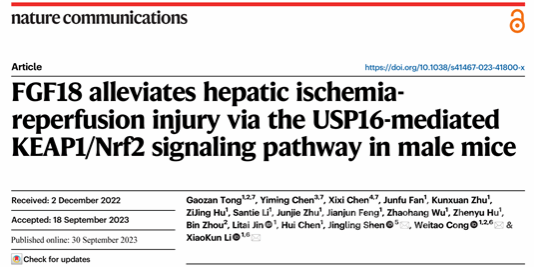- Nat Commun︱Academician Li Xiaokun’s team reveals FGF18 as a potential new therapeutic target for hepatic ischemia-reperfusion injury
- Author:School of Pharmaceutical Sciences Date:October 20, 2023
Recently, the team of Academician Li Xiaokuan at Wenzhou Medical University published a paper, entitled "FGF18 alleviates hepatic ischemia-reperfusion injury via the USP16-mediated KEAP1/Nrf2 signaling pathway in male mice", online in the journal Nature Communications. The study confirmed that FGF18 plays a key role in the process of hepatic ischemia-reperfusion, which can significantly alleviate hepatic ischemia-reperfusion injury (IRI). The research was carried out at the School of Pharmaceutical Sciences of Wenzhou Medical University. Academician Li Xiaokun and Researcher Cong Weitao of Wenzhou Medical University, and Professor Shen Jingling of Wenzhou University are the corresponding authors of the paper. Tong Gaozan, a doctoral student at the School of Pharmaceutical Sciences, Chen Yiming, a chief surgeon of the Hepatobiliary and Pancreatic Surgery Department of the Second Affiliated Hospital, and Chen Xixi of the Pharmacy Department of Taizhou Central Hospital are the co-first authors of the paper.

Liver IRI is the most common complication during liver resection and transplantation, which seriously affects the patient's surgical prognosis. However, the mechanisms of hepatic IRI have not been fully elucidated. Fibroblast growth factor 18 (FGF18) is a member of the exocrine growth factor family and is widely involved in various cellular metabolic activities. Mechanistically, FGF18 treatment reduces the levels of USP16, thus increasing the ubiquitination levels of KEAP1, activating the Nrf2 signal, and ultimately alleviating liver IRI. In addition, the authors found that FGF18 regulates USP16 through the negative feedback loop of Nrf2 and USP16, suggesting that targeted FGF18/USP16/KEAP1 signaling pathway can be a new therapeutic approach for hepatic IRI. This study aimed to explore the role of FGF18 in liver IRI and its specific regulatory mechanism through a series of in vivo and in vitro experiments.

The results of this study confirm that FGF18 plays a key role in liver ischemia and reperfusion. FGF18 treatment can significantly alleviate hepatic IRI because it reduces oxidative stress and inflammatory response thus decreasing apoptosis of hepatocytes. Through experiments, the study found that in the process of ischemia-reperfusion, hepatic stellate cells secrete FGF18 which acts on hepatocytes upon liver IRI.
